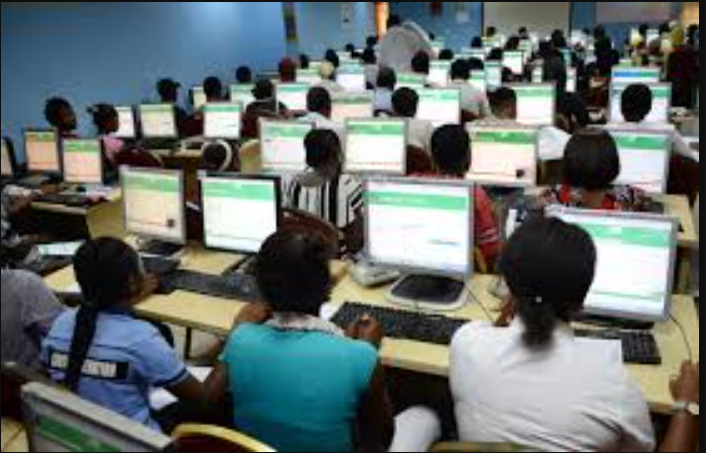The recently released 2025 West African Senior School Certificate Examination (WASSCE) results have triggered widespread outrage across Nigeria, following the revelation that only 38% of the over 1.9 million candidates obtained credits in five subjects, including English Language and Mathematics.
The West African Examinations Council (WAEC), in a press briefing held on Monday, August 4, disclosed that just 754,545 out of 1,969,313 candidates passed the examination, representing a sharp 33.8% drop from last year’s performance rate of 72.12%. This decline has sparked calls for a total review of Nigeria’s education system.
Head of the Nigeria Office of WAEC, Dr. Amos Dangut, attributed the poor results in part to stricter anti-malpractice measures, particularly the introduction of “serialisation” in key subjects like Mathematics and English Language. This strategy, which assigns each candidate a distinct question paper type, aimed to prevent collusion and reduce cheating. While it succeeded in curbing malpractice, Dangut admitted it exposed the lack of adequate preparation among candidates, especially in objective papers where a noticeable decline was recorded. He also mentioned that despite clear instructions, students continued copying from each other even when assigned different versions of the exam.
Public frustration was further fueled by the chaotic conduct of some of the exams, notably in Lagos, Ogun, Osun, and Taraba States, where students were forced to write exams late into the night using torchlights and candles. WAEC explained that the delay was necessary to protect the exam’s integrity after question papers were leaked online. However, many stakeholders believe the situation was inexcusable and a national embarrassment.
For candidates like Kamsiyochukwu Destiny Igwe, who had high expectations, the experience was disappointing. “I didn’t reach my target,” he said. “I encountered some challenges like late night exams. My school passed by 75%, while 25% failed.”
Education experts and school administrators have been vocal in their reactions. Prof. Mahfouz Adedimeji, Vice Chancellor of the African School of Economics, Abuja, pointed to five core contributors to the decline: social, economic, systemic, technological, and personal. He warned of “technoference” — the interference of technology in learning — with students spending more time on social media than studying. He emphasized the need to change the attitude of young people who now see education as a scam.
The Head of Mare Schools, Mr. Onanuga Olubayo, said the poor results were inevitable given the disorganisation witnessed during the exams. “It reminds us of what happened with JAMB earlier this year. WAEC 2025 should be declared null and possibly retaken,” he said, urging the government to embark on meaningful educational reforms and involve all stakeholders in the process.
Similarly, the National President of the Association for Formidable Educational Development (AFED), Mr. Emmanuel Orji, said the current curriculum design, delivery models, and assessment systems are no longer effective. He called for a major review to make them more inclusive and aligned with real-world needs, while also advocating for improved access to educational resources and a shift toward critical thinking and creativity in assessments.
Dr. Saleh Adamu Kwaru of the Coalition of Non-State Schools in Nigeria stressed the need to review teaching methods and strengthen instruction. “Exam results reflect teaching quality,” he said. “We must reassess the learning process.”
Dr. Adebola Obe of Platform Schools, Lagos, lamented that students no longer fear failure or value academic achievement. “The sense of urgency and dedication that once drove students is fading,” he said, calling on WAEC and the government to restore academic rigour and promote a culture of excellence.
NAPPS National President, Chief Yomi Otubela, said the result reflects the state of the education ecosystem. While commending WAEC’s efforts to preserve integrity, he advocated for better teacher training, curriculum reform, infrastructure development, and the integration of digital literacy and emotional support into the learning process.
Founder of IA-Foundation, Ibironke Adeagbo, highlighted a long list of problems: shortage of qualified teachers, poor exam conditions, widespread malpractice, technical bottlenecks, and systemic delays. She called for urgent government action to recruit and train qualified teachers, ensure stable power and digital infrastructure for exams, provide resit opportunities, and support disadvantaged learners through scholarships and vocational training.
The decline in the 2025 WAEC results is seen by many as more than just an academic issue — it is a national crisis. The figures are a stark reflection of deeper systemic failings and the growing disillusionment of young Nigerians with the education system. If Nigeria is to preserve its human capital and future workforce, experts agree that immediate, bold, and sustained reforms are needed across all levels of the education sector.

